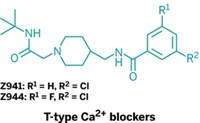Advertisement
Grab your lab coat. Let's get started
Welcome!
Welcome!
Create an account below to get 6 C&EN articles per month, receive newsletters and more - all free.
It seems this is your first time logging in online. Please enter the following information to continue.
As an ACS member you automatically get access to this site. All we need is few more details to create your reading experience.
Not you? Sign in with a different account.
Not you? Sign in with a different account.
ERROR 1
ERROR 1
ERROR 2
ERROR 2
ERROR 2
ERROR 2
ERROR 2
Password and Confirm password must match.
If you have an ACS member number, please enter it here so we can link this account to your membership. (optional)
ERROR 2
ACS values your privacy. By submitting your information, you are gaining access to C&EN and subscribing to our weekly newsletter. We use the information you provide to make your reading experience better, and we will never sell your data to third party members.
Biological Chemistry
Calcium Misregulation Contributes To Alzheimer's Disease
July 7, 2008
| A version of this story appeared in
Volume 86, Issue 27
Two studies provide further evidence that calcium regulation in the brain is intimately involved in Alzheimer's disease. Philippe Marambaud of the Feinstein Institute for Medical Research, in Manhasset, N.Y., and colleagues report in Cell (2008, 133, 1149) their discovery of a gene that appears to code for a calcium ion channel in the membrane of brain cells. The team determined that one version of the gene is more common in patients with late-onset Alzheimer's. That version produces a calcium channel that reduces passage of calcium ions into brain cells. The reduction in calcium increases production of amyloid-β peptides, which are believed to cause Alzheimer's. Meanwhile, J. Kevin Foskett of the University of Pennsylvania, a coauthor of the Cell paper, led a separate study on the activity of a different calcium ion channel that controls calcium movement inside cells (Neuron 2008, 58, 871). The group studied the channel's role in early-onset Alzheimer's, a form of the disease that is characterized by production of mutant presenilin proteins. Using cultured cells, Foskett's team found that mutant presenilins enhance the activity of the calcium channel and that the exaggerated calcium signaling increases amyloid-β production. Foskett says the two papers together are "compelling because they link calcium ion channels and calcium misregulation to both forms of Alzheimer's."



Join the conversation
Contact the reporter
Submit a Letter to the Editor for publication
Engage with us on Twitter